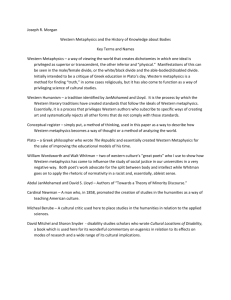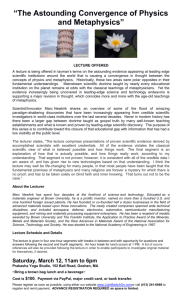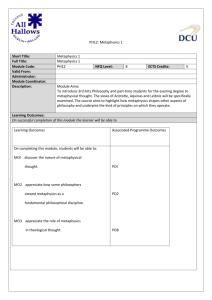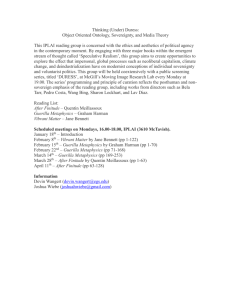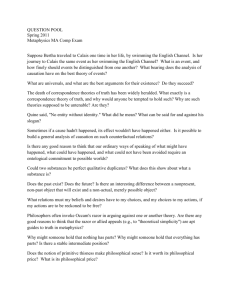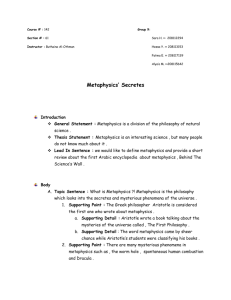metaphysics 07-28
advertisement
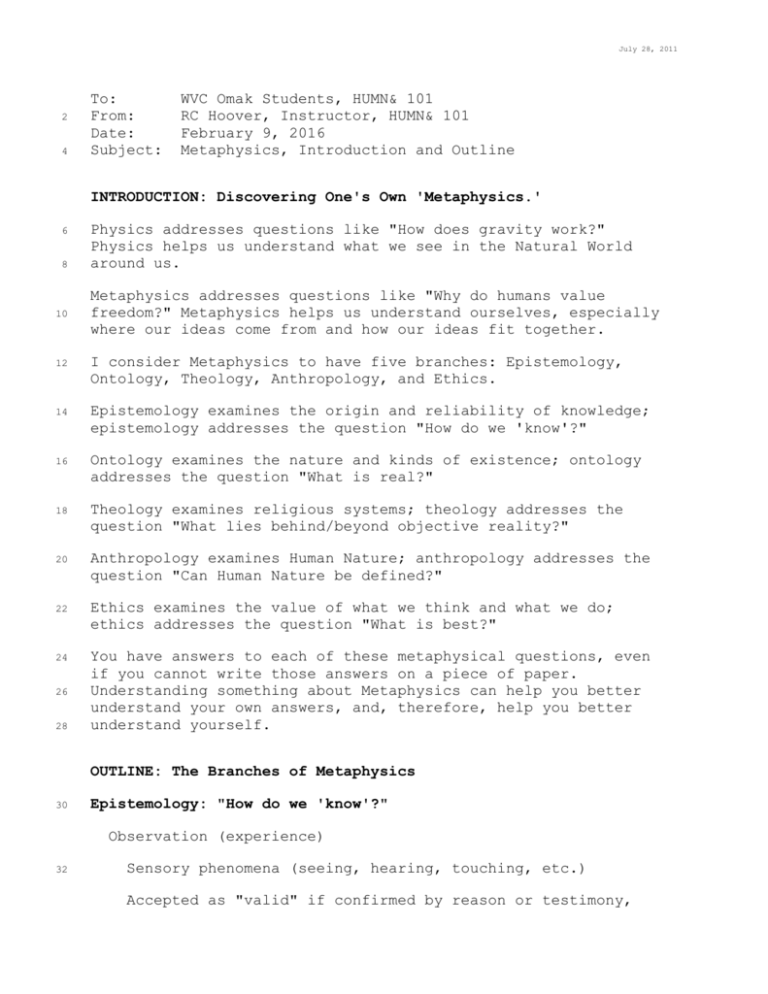
July 28, 2011 2 4 To: From: Date: Subject: WVC Omak Students, HUMN& 101 RC Hoover, Instructor, HUMN& 101 February 9, 2016 Metaphysics, Introduction and Outline INTRODUCTION: Discovering One's Own 'Metaphysics.' 6 8 10 Physics addresses questions like "How does gravity work?" Physics helps us understand what we see in the Natural World around us. Metaphysics addresses questions like "Why do humans value freedom?" Metaphysics helps us understand ourselves, especially where our ideas come from and how our ideas fit together. 12 I consider Metaphysics to have five branches: Epistemology, Ontology, Theology, Anthropology, and Ethics. 14 Epistemology examines the origin and reliability of knowledge; epistemology addresses the question "How do we 'know'?" 16 Ontology examines the nature and kinds of existence; ontology addresses the question "What is real?" 18 Theology examines religious systems; theology addresses the question "What lies behind/beyond objective reality?" 20 Anthropology examines Human Nature; anthropology addresses the question "Can Human Nature be defined?" 22 Ethics examines the value of what we think and what we do; ethics addresses the question "What is best?" 24 You have answers to each of these metaphysical questions, even if you cannot write those answers on a piece of paper. Understanding something about Metaphysics can help you better understand your own answers, and, therefore, help you better understand yourself. 26 28 OUTLINE: The Branches of Metaphysics 30 Epistemology: "How do we 'know'?" Observation (experience) 32 Sensory phenomena (seeing, hearing, touching, etc.) Accepted as "valid" if confirmed by reason or testimony, Hoover, Metaphysics, July 28, 2011, Page 2 34 36 otherwise rejected as "illusion" (mirage, hallucination, hypochondria) Reason (cognition) Intellectual operation (a+b=c 38 40 a=1 b=2 c=?) Accepted as "valid" if confirmed by observation or testimony, otherwise rejected as "speculation" Testimony (in court, textbooks, used-car salesmen, memory) 42 Information from others (an earlier self?) about something neither experienced nor reasoned 44 Accepted as "valid" if witness has credibility, otherwise rejected as "mere opinion" or "falsehood" Other (inspiration/intuition/clairvoyance/second sight) 46 Sense of the unobserved, unreasoned, and unreported, which is yet compellingly known (sense of impending danger) 48 Accepted as "valid" if and only if confirmed by both observation and reason, otherwise rejected as "mysticism" 50 Ontology: "What is real?" (Note: a good starting point is the tradition that something is real if we should react to it) 52 54 Each type of reality has its own pattern of operation; these patterns resemble one another, but are not identical (flowers, friendships, and the future do not "grow" in the same way) Objective 56 Matter (water, air, a flower) Energy (sunlight, fire, pressure) 58 Subjective Feelings (love, fear, remorse) 60 Ideas (freedom, respect, duty) Potential 62 The future (after class, next weekend, when I ____________) The unseen (see Theology, below) Hoover, Metaphysics, July 28, 2011, Page 3 64 66 Theology: "What lies behind/beyond objective reality?" What lies behind/beyond objective reality? Nothing! (Radical materialism) 70 Nothing lies behind/beyond objective reality, because objective reality is the only reality (everything is cause and effect operating on matter and energy without influence from mysterious or mystical forces: Naturalism) 72 Nothing lies behind/beyond objective reality, and that's okay (Nihilism) 74 Nothing lies behind/beyond objective reality, and that's NOT okay (Existentialism) 68 What lies behind/beyond objective reality? Something . . . 76 But knowledge of what lies behind/beyond objective reality is not reliable . . . 78 80 Something might be there, but, if there is, it is so different from what we know that we cannot understand it (philosophical agnosticism) 82 I do not know what is there, at least not yet (agnosticism) 90 First, scientifically reliable knowledge is based on rigorous observation of "objective reality;" second, Theology addresses a realm "behind/beyond objective reality"; therefore, logically, science cannot develop reliable knowledge about "What lies behind/beyond objective reality"; so, science is unable to support or refute the extra-material claims of Theology (Scientific Naturalism) 92 And knowledge of what lies behind/beyond objective reality is reliable; in fact we can know . . . 84 86 88 94 96 98 Everything about of what lies behind/beyond objective reality: radical spiritism or spiritualism (popular circa 1840-1930: Ouija boards, séances, etc.) Something about of what lies behind/beyond objective reality, specifically we know that . . . What lies behind/beyond objective reality includes a number of diverse spirits Hoover, Metaphysics, July 28, 2011, Page 4 100 102 104 106 Many are spirits with personalities (human [including the dead], near human, not-so-human, good, neutral, evil: spiritism (see radical spiritism, above) Many of these spirits can and should be associated with animals, objects, and places (animism, found in many Native American traditions and in Japanese Shinto) All things are one divine substance: pantheism 108 110 112 114 116 118 120 Transcendentalism: (Ralph Waldo Emerson) when one does not experience nature, one will suffer spiritual distress and psychic damage Hinduism: karma; reincarnation; caste system; the Vedas; Vishnu (the preserver) and Shiva (the destroyer) are metaphors representing aspects of the all-divine (Brahman), not actual divine persons Buddhism: offshoot of Hinduism; primary teachings are found in the Tripitaka (Sanskrit for "Three Baskets"): Vinaya Pitaka (the "Rules of Discipline"), Sutra Pitaka ("Buddha's Teachings and Sermons"), and Abhidharma Pitaka ("Further Doctrine") Many gods exist: polytheism Greek pantheon: Zeus, Apollo, Aphrodite, etc. 122 Norse pantheon: Odin, Thor, Freya, etc. One God exists: monotheism 124 Judaism (Moses, Torah, Hasidic, Orthodox, Reform) 126 Christianity (Paul, Holy Bible; Coptic, Roman Catholic, Eastern Orthodox, Protestant) Islam (Mohammed, Qur'an; Sunni, Shi‘a, Sufi) 128 Deism (Benjamin Franklin, Thomas Jefferson) 130 God does not exist: atheism (Bertrand Russell, Madeline Murray O'Hare; see also Naturalism, noted above) 132 One's metaphysical assumptions about theology determine one's view of luck, fate, and magic (see handout "Magic") Hoover, Metaphysics, July 28, 2011, Page 5 Anthropology: "Can Human Nature be defined?" 134 No, humans have no clearly defined nature Yes, individual humans have a clearly defined Nature . . . 136 . . . and Human Nature is innate Innately good (Rousseau) 138 Innately bad (Glaucon, Machiavelli) Innately mixed (Schaeffer) 140 Innately neutral (Locke) . . . and Human Nature is a product of particular influences 142 Fate (one's nature is determined by the gods, the stars, etc.) 144 Free will (one's nature is determined by one's own choices) 146 Experience ("nurture" side of nature/nurture argument) Biology ("nature" side of nature/nurture argument) 148 . . . and Human Nature is a combination of both "innate quality" and "particular influences" 150 . . . and Human Nature remains neutral, but is labeled in various ways by various others 152 Yes, as a group, humans have a clearly defined Nature . . . 154 156 158 160 162 . . . and something within us pushes us toward our fate, for example Humanity's continuing social and biological evolution pushes us towards successful adaptation to our social/physical environment Humanity's warlike nature pushes us towards nuclear self-destruction . . . and something outside us pulls us toward our fate, for example Karma will ordain our future (Bhagavad-Gita) Hoover, Metaphysics, July 28, 2011, Page 6 God has ordained a Judgment Day (Holy Bible) 164 The Historical Dialectic will result in utopian communism (Das Kapital) 166 . . . and that nature is best understood in terms of Cycles (human organization follows a pattern), for example 168 170 172 174 176 Human organization centers first on the self, then on the clan, then on the tribe, then on the nation, then repeats, centering on the self, then on the clan, then on the tribe, then on the nation . . . Civilization overcomes barbarism, then barbarism overcomes civilization, then civilization . . . (The Beer Theory) . . . and there are Other Possibilities, for example Neither "Human Nature" nor destiny can dominate us (free will, freedom, self-determination) It all depends on the environment (Skinner) 178 If Human Nature can be defined, is it consistent? No, Human Nature is not consistent 180 . . . and people change at random . . . and people change for clear reasons 182 Internal reasons Conscious, informed choice (Free Will) 184 Emotional reasons (love, bitterness, "growing up," etc.) 186 Spiritual reasons (finding/losing faith, etc.) External reasons 188 Tragedy Chemical influence (drugs, nutrition, etc.) 190 Other (presence or absence of "support," etc.) Yes, Human Nature is consistent; specifically . . . 192 . . . Human Nature is consistent across time within the Hoover, Metaphysics, July 28, 2011, Page 7 individual (people never really change) 194 The four humours: Sanguine (Air), Choleric (Fire), Melancholic (Earth), Phlegmatic (Water) 196 The twelve signs of the Zodiac Birth Order 198 Other (question to students: any suggestions?) . . . Human Nature is consistent within specific Groups 200 202 Involuntary groups Family/clan/tribe/cast (Kennedy = rich liberal; Bush = rich conservative) Gender (men are all the same; women are all the same) 204 To understand men, one should consider money, ideology, conscience, and ego (MICE) 206 To understand women, one should consider security, ego, and attitude (SEA) 208 Culture/socioeconomic stratum (the rich are selfish; the poor are dirty) 210 Aesthetic appeal (ugly = worthless; beauty = worthy: high school) 212 Ethnicity (Jews cause our problems: Nazi Germany) Age (old people are weak) 214 Voluntary groups Social (sorority girls are stuck-up) 216 Professional (lawyers are dishonest) 218 Political (Democrats are liberal big-spending wimps; Republicans are conservative heartless warmongers) Religious (Puritans were intolerant prudes) 220 222 . . . Human Nature is Universal (group membership does not matter: people are the same everywhere, always have been, always will be) Hoover, Metaphysics, July 28, 2011, Page 8 Ethics: "What is best?" the beautiful, the true, and the good. 224 "What is beautiful?" (Aesthetics) Can we distinguish the "beautiful" from the "ugly"? 226 Yes, beauty is as real as justice is (humans innately sense its presence and its absence) 228 No, all answers are subjective and probably self-serving Why do we call something or someone "beautiful"? 230 Our sojourn in the Realm of the Ideal (Plato) Cultural norms 232 Peer pressure Personal taste 234 Evolutionary advantage "What is true?" (Logic and Rhetoric) 236 Can we tell whether or not a statement is "true"? No, we cannot tell when a statement is true: 238 240 Radical skepticism: "truth" does not exist; all who claim that something is "true" are either deceiving themselves or attempting to deceive others 242 Implications: difficult to deceive, but increases risk for feeling adrift in a meaningless universe 244 Policy: recommendations focus on short term solutions promoted in terms of self-interest 246 248 250 Yes, we can tell when a statement is true, because truth exists, and we know how "truth" works Foundationalism: "the truth is out there"; reason and experience lead us ever closer to objective truth; intuition is valuable when it moves reason and experience in new directions Implications: if I see X as true, then you should, too 252 Policy: recommendations tend to be rigid, promoted in terms of scientific certainties and/or moral absolutes Hoover, Metaphysics, July 28, 2011, Page 9 256 Radical positivism: "it only counts if we can quantify it"; basis for traditional Western scientific inquiry (see Naturalism, note above) 258 Implications: powerful tool for addressing objective reality 254 260 262 264 Policy: recommendations dismiss the subjective or the potential as irrelevant or unknowable, promoted in terms of "studies show . . ." Anti-foundationalism: "truth is a cultural artifact"; no truth exists objectively; all so called truth hinges on a cultural/historical/linguistic context 266 Implications: often suspicious of Foundationalism and Radical positivism 268 Policy: recommendations emphasize cultural context, promoted in terms of "cultural awareness" 270 Individualism: "the self is the first, best, and final judge of truth" 272 Implications: resists use of "truth" as a tool of control 274 Policy: recommendations tend to be based on "that's what I think" or "it works for me" 276 278 280 282 284 286 288 Limited Divine Inspiration: "God speaks truth to us"-knowledge not limited by any of the above forms Implications: any of the above form of truth are subject to being supplemented by God (or gods) providing information (info verifiable to x degree) directly to someone (that one credible to x degree)-consensus on verifiability and credibility sometimes firm, sometimes elusive Policy: recommendations tend to be based on "The Word of God" which must then be understood and applied by people--with varied historical results (good and bad by modern tastes), as per India, Meso-America, the Middle East, Medieval Europe, modern Iran, etc. Does "truth" matter? No, truth does not matter . . . Hoover, Metaphysics, July 28, 2011, Page 10 290 Because "truth" does not exist (skepticism) 292 Because "truth" is only relative (anti-foundationalism or individualism) 294 296 298 Yes, truth does matter because "truth" is the key to reality (foundationalism, radical positivism, and limited divine inspiration) "What is good?" (Morality) Satisfying answers to the question "What is good?" can be based on tradition, for example "That's how we did it in my family" 300 "It works for me" 302 Ten Commandments: no other gods; no idols; no blasphemy; keep Sabbath; honor parents; no murder; no adultery; no stealing; no lying; no jealousy 304 Seven deadly sins: pride, envy, wrath, sloth, greed, gluttony, and lust 306 Seven cardinal virtues: faith, hope, love, prudence, justice, fortitude, and temperance 308 Fruit of the Spirit: love, joy, peace, patience, kindness, goodness, gentleness, and self-control 310 Four qualities of the warrior: courage, fortitude, wisdom, generosity 312 Four noble truths: life is filled with pain; pain is caused by the need to possess; there is a way out of pain; that way is the eightfold path 314 316 318 320 322 324 Eightfold path: right views; right intentions; right speech; right conduct; right livelihood; right effort; right mindfulness; right concentration Satisfying answers to the question "What is good?" can be based on careful thought, recognizing that the question "What is good?" focuses both on the individual and on the group When focusing on the individual, a moral system (a set of related answers to the question "What is good?") addresses two circumstances: normal and special Hoover, Metaphysics, July 28, 2011, Page 11 326 When a moral system focus on the individual under normal circumstances, it answers questions concerning Rights (should you be free to leave if you want?) 328 Responsibilities (under what circumstances do you have a responsibility to stay? to go?) 330 Proper privileges (if you stay, what should--and what shouldn't--you be granted for staying?) 332 334 When a moral system focuses on the individual under special circumstances, it answers the questions When should one give/receive praise? When should one give/receive reproach? 336 338 340 342 344 346 348 350 352 354 356 When focusing on the group, a moral system addresses normal circumstances and special circumstances When a moral system focuses on the group under normal circumstances, it answers questions concerning Justice (what are the rules? are the rules fair? do they apply here? should the rules change? who has the right to answer these questions?) Equity (does everyone have "enough"? what is "enough"? does anyone have "too much"? what is "too much"? who has the right to answer these questions?) Liberty (should the group allow members to do this? should the group create rules governing this? who has the right to answer these questions?) Peace (a condition which exists when the group has reached a stable, freely-chosen consensus on the answers to questions of Justice, Equity, and Liberty) When a moral system focuses on the group under special circumstances, it answers the questions What is (un)acceptable or (dis)honorable? During conflict? (Domestic dispute? Legal dispute? Riot? War?) When "others" are among us? (Guests? Intruders?) Hoover, Metaphysics, July 28, 2011, Page 12 358 360 When/how should we celebrate? Discussion of moral questions often fails to produce satisfying answers Several factors contribute to this failure 362 Casting moral questions in terms of "harm" Failing to clarify exactly what we mean by "harm" 364 366 368 Allowing the discussion of "who suffers harm" to vacillate between "the individual" and "the group" Such failure impedes the development of useful answers, but this failure obscures the fact that our manner of addressing moral questions is an improvement over the two primary alternatives: tradition and the strong 370 Answers from tradition have had difficulty adjusting to changes in the environment (physical or social) 372 Answers from the strong have had difficulty addressing the concerns of the weak (both individuals and groups) 374 376 If one claims the right to answer a moral question, and if one cannot provide satisfying answers to the questions below, then one's claim to "moral authority" is ill-founded Questions about the nature of ethics 378 Why does a satisfying answer come from "ethics" rather than from science or whim? 380 What sort of ethical answer really satisfies the questioner? 382 384 Questions about the nature of the relevant circumstances What does one need to know about the situation to provide a satisfying answer? Does the one attempting to answer know this? 386 Questions about Human Nature itself Why do we hunger for answers? 388 What do we do with the answers when they get them? Hoover, Metaphysics, July 28, 2011, Page 13 QUESTIONS ASSOCIATED WITH METAPHYSICS 390 1. Which branch of metaphysics interests you the most? Why? 392 2. Identify, by line numbers, three statements in the OUTLINE which come close to expressing your own views? Why these statements and not others? 394 396 398 400 3. Do you, and those with whom you converse, truly understand one another when you discuss the issues raised in the OUTLINE? a. Do you need to understand your ideas before you can discuss these issues? If so, why? b. Is it in discussing these issues that you come to understand your ideas? If so, why? RCH (with thanks to GVH, LAW, JRW, and KJ)

